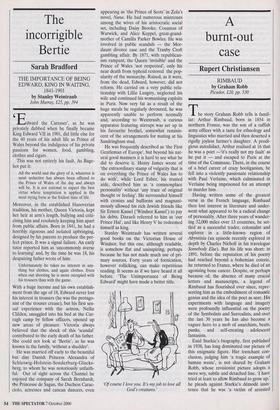The incorrigible Bertie
Sarah Bradford
THE IMPORTANCE OF BEING EDWARD, KING IN WAITING, 1841-1901 by Stanley Weintraub John Murray, £25, pp. 394 ‘E dward the Caresser', as he was privately dubbed when he finally became King Edward VII in 1901, did little else for the 40 years of his adult life as Prince of Wales beyond the indulgence of his private passions for women, food, gambling, clothes and cigars.
This was not entirely his fault. As Bage- hot put it: All the world and the glory of it, whatever is most seductive has always been offered to the Prince of Wales of the day and always will be. It is not rational to expect the best virtue where temptation is applied in the most trying form at the frailest time of life.
Moreover, in the established Hanoverian tradition, his mother, Queen Victoria, kept her heir at arm's length, bullying and criti- cising him and resolutely keeping him apart from public affairs. Born in 1841, he had a horribly rigorous and isolated upbringing, designed by his parents to produce the per- fect prince. It was a signal failure. An early tutor reported him as 'uncommonly averse to learning' and, by the time he was 18, his despairing father wrote of him: •
Unfortunately he takes no interest in any- thing but clothes, and again clothes. Even when out shooting he is more occupied with his trousers than with the game.
With a huge income and his own establish- ment from the age of 18, Edward never lost his interest in trousers (he was the protago- nist of the trouser crease), but his first sex- ual experience with the actress, Nellie Clifden, smuggled into his bed at the Cur- ragh camp by fellow officers, opened up new areas of pleasure. Victoria always believed that the shock of this 'scandal' contributed to the early death of his father. She could not look at ‘Bertie', as he was known in the family, 'without a shudder'.
He was married off early to the beautiful but dim Danish Princess Alexandra of Schleswig-Holstein-Sonderburg-Glucks- berg, to whom he was notoriously unfaith- ful. Out of sight across the Channel he enjoyed the company of Sarah Bernhardt, the Princesse de Sagan, the Duchess Carac- ciolo, actresses and cancan dancers, even appearing as 'the Prince of Scots' in Zola's novel, Nana. He had numerous mistresses among the wives of his aristocratic social set, including Daisy Brooke, Countess of Warwick, and Alice Keppel, great-grand- mother of Camilla Parker Bowles. He was involved in public scandals — the Mor- daunt divorce case and the Tranby Croft gambling affair. By 1871, with republican- ism rampant, the Queen 'invisible' and the Prince of Wales 'not respected', only his near death from typhoid restored the pop- ularity of the monarchy. Raised, as it were, from the dead, Edward, however, did not reform. He carried on a very public rela- tionship with Lillie Langtry, neglected his wife and continued his womanising exploits in Paris. Now very fat as a result of the huge meals he regularly devoured, he was apparently unable to perform normally and, according to Weintraub, a curious apparatus featuring stirrups was set up in his favourite brothel, somewhat reminis- cent of the arrangements for mating at his Sandringham stud.
He was frequently described as 'the First Gentleman of Europe', but beyond his nat- ural good manners it is hard to see what he did to deserve it. Henry James wrote of `the extraordinary stamp of vulgarity that is on everything the Prince of Wales has to do with', while Lord Esher, his trusted aide, described him as 'a commonplace personality' without 'any trace of original thought or feeling'. He surrounded himself with cronies and buffoons and magnani- mously allowed his rich Jewish friends like Sir Ernest Kassel (`Windsor Kassel') to pay his debts. Disraeli referred to him as 'our Prince Hal', and like Henry V he redeemed himself as king.
Stanley Weintraub has written several good books on the Victorian House of Windsor, but this one, although readable, is somehow flat and uninspiring, perhaps because he has not made much use of pri- mary sources. Forty years of fornication, however rollicking, can make repetitious reading. It seems as if we have heard it all before. 'The Unimportance of Being Edward' might have made a better title.
`Of course I love you. Its my job to love all God's creatures.'


















































































 Previous page
Previous page